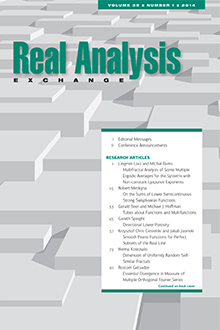Abstract
Let $f$ be an interval map in a neighborhood of the fixed point $0$ with \(-1<\lambda=f'(0)<0\). Continuity of $f$ is not assumed at points other than the fixed point. It is shown that if either $$f\circ f(x)\geq\lambda^{2}x \text{ or }f\circ f(x)\leq\lambda^{2}x$$ for each $x$ in a neighborhood of $0$, then the Koenigs' sequence \(\{\phi_{k}\}\) defined by $\phi_{k}(x)=\dfrac{f^{k}(x)}{\lambda^{k}}$ converges uniformly to a limit \(\phi\) in a neighborhood of $0$ with \(\phi(0)=0\) and \(\phi'(0)=1\). Two examples are presented, the first of which is a \(C^{1}\) map $f$ with \(f(0)=0\) and \(-1<f'(0)<0\) having a divergent Koenigs' sequence. The other example is a \(C^{1}\) convex map $g$ with \(g(0)=0\) and \(0<g'(0)<1\) for which the associated Koenigs' sequence diverges and which has no orientation-reversing composition square root that is differentiable at $0$.
Citation
D. J. Dewsnap. P. Fischer. "Interval Maps and Koenigs’ Sequences." Real Anal. Exchange 25 (1) 205 - 222, 1999/2000.
Information





